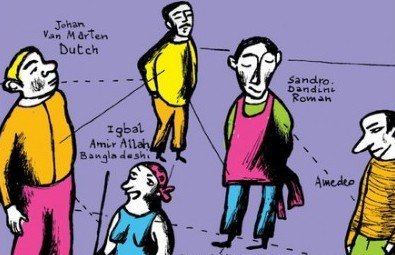New Italians: A murder set in a Roman palazzo reveals the surprising diversity of its neighbors
Clash of Civilizations Over an Elevator in Piazza Vittorio, by Amara Lakhous (2006, Europa Editions)
Despite a certain glorious 150-year-history of an established, unified Italy, what is the Italian national identity is, in contrast, an ongoing, evolving process that today espouses more complexity and richness than could have ever been predicted. United when it comes to soccer or spaghetti, Italians actually seem to have more things that separate them than bind them together, starting from regional accents to political beliefs, lifestyle, consumption habits, geographical landscapes and cultural references. To make things even more complex, this extraordinary variety in the ways of being Italian is today integrated and amplified by an ever-growing presence of immigrants and foreign cultures throughout the country, which makes the contemporary Italian identity even more fragmented, multifaceted and difficult to frame. The development of Italy as a multicultural and multiethnic society therefore calls for a redefinition of the Italian national sentiment, in the light of the challenges and opportunities for economic and cultural growth offered by the presence of the new “Brotherhood of Italy”.
To better understand what being Italian really means today, it is particularly interesting to dwell on one of the most promising voices of the Italian literary scene, Amara Lakhous. As the name immediately suggests, Amara is a one-of-akind Italian: his personal story, as well as his books, can be considered as a snapshot of the Italian contemporary society,
with all its cultural contrasts and complex geographical stratifications. Born in Algiers in 1970, he has been living in Rome since 1995, where he graduated in Cultural Anthropology and recently completed a PhD thesis entitled “Living Islam as a Minority”. His life story and personal experience in Italy make him an Italian to all intents and purposes. His most famous book, Clash of Civilizations Over an Elevator in Piazza Vittorio, published in Italy in 2006 (E/O) and translated into English in 2008 (Europa editions), won prestigious literary prizes and has recently become a film.

Written in a darkly humorous vein, the novel is set in an apartment building of the most multiethnic and colourful neighbourhoods in Rome, Piazza Vittorio. When one of the tenants, the so-called Gladiator, is mysteriously murdered, the inhabitants of the building are called to tell their “truth.” So we get to know the gossipy Neapolitan porter, the Milanese Professor who has it in for the Romans, the Iranian cook who hates pizza, the lonely old lady obsessed with her little dog, the young Dutch filmmaker, the Peruvian housemaid mistaken for a Philippine and, above all, Amedeo, an educated, melancholic Algerian exile, who is a profound connoisseur of the history and topography of Rome and is the prime suspect of the murder. The novel takes the form of a polyphonic chorus,with each character speaking in the first person in each chapter of the book, thus producing a picturesque, subtly ironic collage of prejudices, misunderstandings, solitude, marginalization, indifference
and fears.
The elevator, as a narrow space forcedly shared by strangers, therefore becomes a powerful metaphor for a multilayered, sometimes claustrophobic, society where people from different backgrounds live side by side, without really seeing each other. In a country where “the greatest player of all time, Paulo Roberto Falcao, [was] a foreigner,” and an immigrant
“speaks Italian better than many Italians,” the boundaries between national identities become blurred, and all inhabitants of such a chaotic building apartment as Italy can rightfully have their truth about it.
The question posed by one of the characters at the beginning of the book therefore remains an open question: “But then who is Italian? Only someone who was born in Italy, has an Italian passport and identity card, knows the language, has an Italian name, and lives in Italy?”.
The building of the national identity of a country passes through an endless process of contamination and crossbreeding, which moves our mental and cultural barriers a little bit further. In this sense, Amara Lakhous’ novel contains a gem of a lesson that any Italian worthy of this name should learn.
